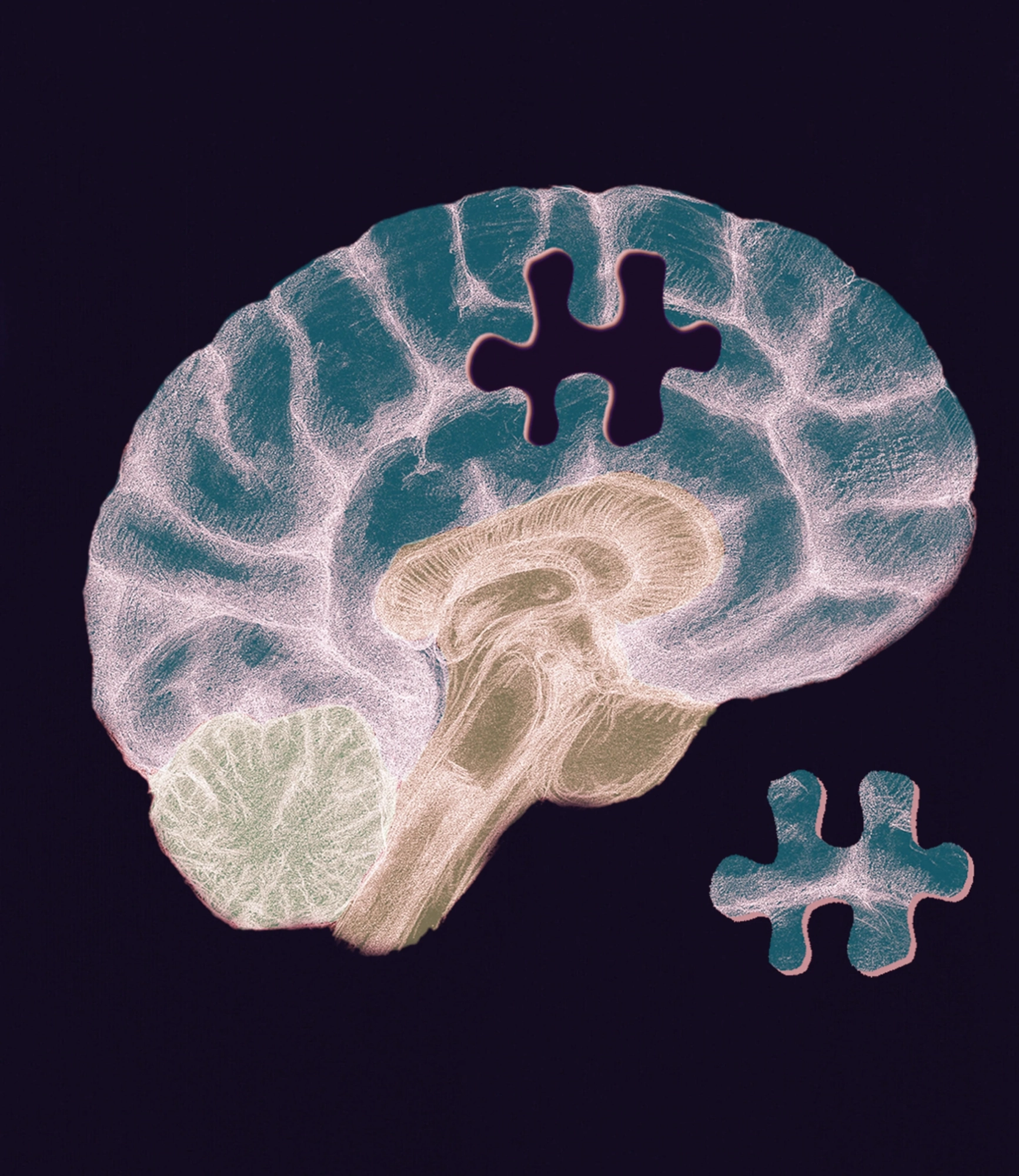 If you find yourself forgetting things, here are a few science-backed ways to remember things better. Illustration by Spencer Sutton/Jessica Wilson/Science Photo Library
If you find yourself forgetting things, here are a few science-backed ways to remember things better. Illustration by Spencer Sutton/Jessica Wilson/Science Photo Library
Forget your keys again? Studying for a test? The best method for improving your memory depends on what youre trying to remember.
Forgetting is normal, but it can make life difficult. You might forget someones name seconds after you meet them, blank on where youve put your keys, or miss an important birthday.
Memories are fallible for a reason. Without a mechanism for forgetting, you would be unable to filter out unnecessary information when youre trying to remember something. You don't want to fill your brain with clutter, says Charan Ranganath, a neuroscientist at the University of California, Davis.
( Neurons Could Outlive the Bodies That Contain Them)
To improve your memory, however, most doctors will recommend a few basic life changes. For one, its particularly important to get enough sleep, because the brain takes this time to review what youve learned and store it in long-term memory, says Michael Hasselmo, a neuroscientist at Boston University. Things like exercise and healthy eating also help, he says.
( Your memory, rewired: Read Nat Geo's exploration into the frontier of memory science .)
But if you struggle to remember your grocery list, the good news is that there are several science-backed strategies that can boost your ability to memorize and retain information, experts say. The strategy thats best for you depends on who you are, what youre trying to remember, and why.
We spoke to memory experts about the six top strategies for improving your memoryand how to get started.
Strategy 1: Make meaningful connections
Best for: Remembering any new informationeven random, unconnected facts
When youre learning something new, the brain links those details to information it has already stored away, Ranganath says. So, the easiest way to remember anything is to make it meaningful, he says. In fact, decades of cognitive science research show that meaningful information is easier to remember than random, unconnected facts.
Meaning, in this context, signifies that the information either connects to what you already know, makes sense within context, or has some personal connection to you. For example, studies show that people find it easier to remember new vocabulary if they translate concepts into their own words. Or if youre trying to learn someones name, linking them in your mind to someone else you know with that name might help.
( Are you better than AI at guessing what makes a photo memorable? )
But to remember things that don't inherently have meaninglike a list of numbers or datescreating an artificial meaning can help. This is the idea behind mnemonicsacronyms, rhymes, alliterations, or songs that create associations between new information and existing knowledge or visual imagery, says Daniel Willingham, a psychologist at the University of Virginia.
Lets say you meet someone named Neil who has a big nose or other defining feature, Ranganath says. You might think to yourself Oh Nosy Neil and it could make that persons name easier to remember.
Vivid imagery or interesting narratives can also help make information more meaningful. Trying to memorize the order of all the planets in the solar system? My Very Educated Mother Just Served Us Noodles is one narrative that might help. (Or, if you refuse to accept that Pluto is no longer a planet, perhaps your mother actually served nine pizzas.)
Strategy 2: Space out your study sessionsand let yourself struggle
Best for: Studying for a test, learning a new language, remembering facts in detail
If youre cramming for a test, a studies suggest that spacing out those sessions where youre reviewing foreign language vocabulary or memorizing flashcards can help your brain store memories better and more efficiently. This technique, called spaced repetition, involves revisiting information at increasing intervals.
Spaced repetition works because when you initially learn something, you store it in short-term memory, Ranganath says. The process of consolidating this information into long-term memory, however, takes time and happens offline during periods of rest, he adds.
( The unexpected ways Ozempic-like drugs might fight dementia .)
Another advantage of spaced repetition is that it can help you retrieve that memory when you need it later. Because humans are better at recalling things in their original context, we often struggle to remember things when were no longer in that contextlike the coffee shop where you studied for your test with the smell of roasted beans wafting through the air, Ranganath says. By spacing out your learning, these memories become unmoored from a particular place and time and more likely to be accessible anytime you need it, Ranganath says.
Another way to successfully commit something to memory is to test yourself and let yourself struggle to remember, Ranganath says. For example, rather than rereading your textbook to study for a test, try to quiz yourself first. This process of trying to remember, called retrieval practice, can help solidify the information in your brain, studies show. Struggling to remember something before you find the answer can give your brain a chance to repair the memory and form the neural connections to make the new information stick, Ranganath says.
Thats why, if you struggle with names, it might be beneficial to guess someones name even before you learn it, Ranganath says. Then if I take a moment to think about your name and correct myself once you give me the answer, now my brain will be less likely to come up with all these random associations that are not correct.



Strategy 3: Read out loud
Best for: Short-term memorization like a grocery list
Studies show that reading out loud or even singing words can help you remember information better than just reading it silently, a phenomenon known as the production effect. This might be because speaking out loud activates more senses than silent reading.
When you say things out loud, it fires up neurons in the motor and auditory areas in your brain. The more neural connections a memory has to different regions of the brain, the more distinctive and easier it is to recall, Hasselmo says.
However, Hasselmo cautions that the production effect may not be as powerful for creating long-term memories as other methods, like mnemonics or active recall. In addition, a study published in January 2024 showed that while reading text aloud does help your memory, it doesnt help comprehension. So, this technique might be better for remembering your grocery list rather than studying for a test, experts say.
Best for: When you want to remember a moment from your own life
In addition to reading out loud, engaging your other senses during learning can help you form vivid memories of an experience. Take, for example, misplacing your keys. To find them, your memory must compete with all the other times youve put down your keys, Ranganath says.
To combat this, the next time you put down your keys you might focus on the unique aspects of this particular moment, like the sights, the sounds, the smells, Ranganath says. These sensory experiences will create a distinct memoryand help you find your keys later.
The key to strengthening memories is to increase the number of associations that they have in the brain, says Hasselmo. Focusing on sensory information can activate more parts of the brain, creating memories that are more distributed. A rich visual image with a particular memory increases the number of neurons that are getting activated and number of synapses that are getting modified, he says, making the memory stronger.
Its not as tricky as you might think to train your senses. Discover all the expert tips in our companion story on how to make stronger memories by putting your senses to work.
Best for: Memorizing a long list or material for a speech
The memory palacealso known as the method of lociis an ancient mnemonic technique that studies show can improve retention and recall. This technique is a favorite of memory athletes, some of whom use it to remember tens of thousands of digits of pi.
If the goal is to memorize a list or material for a speech, the method of loci is probably the easiest way to do it, Hasselmo says.
Start by picturing a familiar space like your home. As you walk through that space, create an association between the information you want to remember and a specific location within that space. The more unusual or bizarre the association the better, Hasselmo sayssame for adding sensory information like smells or textures.
( Use this ancient technique to remember (almost) anything .)
To remember a grocery list consisting of a banana, asparagus, and ice, for example, you might imagine entering your house and smashing a banana into the doorway, then plopping a bunch of asparagus on the stairs, and finally dumping a pile of ice into your bed. Then, to remember the three items, you picture yourself retracing your route to retrieve them.
The reason the memory palace works is because it creates relationships between information you want to remember and well-ingrained, existing imagery, Hasselmo explains. Scientists hypothesize that the same brain areas involved in memory, namely the hippocampus, also help you figure out your location in the worldwhich is why navigating a familiar place is a powerful method of remembering things, he says.
However, the effectiveness of the method of loci isnt settled science. Some scientists dont believe its any more efficient than other mnemonic methods. It's just another way to put meaning on something and to really organize information that you need, Ranganath says.
It's just giving you a framework, Willingham agrees.
Strategy 6: Make memories intentionally
Best for: Moments you know you'll want to vividly remember
Ranganath recognizes that for many people, the things they want to remember arent facts and details, but important times in their lives.
To make the most of your memory during a significant event, Ranganath says that you might want to consciously think about what you want to get out of the experience beforehand. That way, youll be better able to be present and focus on what youre experiencing and the emotions that youre feeling.
Often you go to a party and you just expect to get memories from that for free. And that's not how things really work, Ranganath says. So that's probably the advice I would give, is think about what you really want to take away from an experience.



